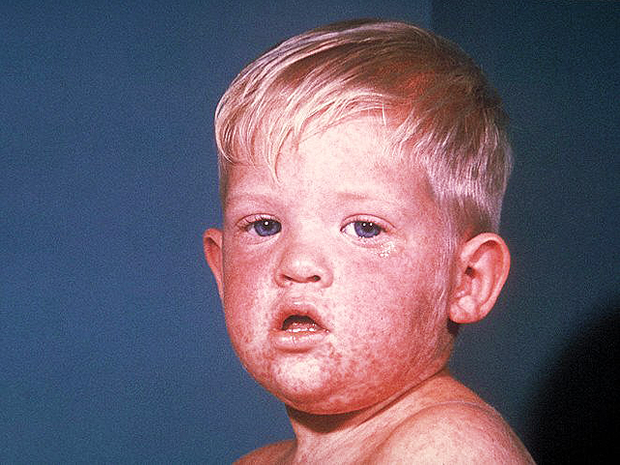Measles on rise in Europe, could spread to U.S.
(CBS/AP) After years of decline, measles is on the rise in Europe, according to a new report published Thursday by the CDC. U.S. health officials are concerned that might lead to more measles cases in the U.S.
PICTURES - Measles: 7 things parents must know
The report used data from the World Health Organization (WHO). More than 26,000 measles cases and nine deaths were reported by European health officials this year. That's a threefold increase in cases from the same time period in 2007, the WHO said.
Measles causes a fever, runny nose, cough and a rash all over the body. It kills about one to two children for every 1,000 it infects, and can also cause pregnant women to have a miscarriage or premature birth.
Where are the biggest outbreaks? France accounted for about 14,000 cases, mainly in children older than five and in young adults. Spain, Romania, Macedonia, and Uzbekistan were also home to big outbreaks.
"We are seeing a surge of cases much larger than we've seen in the past five or six years," Rebecca Martin, immunization program manager for WHO's Europe office in Copenhagen, said. Measles cases had been dropping for years, but began to increase sharply in late 2009.
Low vaccination rates fueled the epidemic, Martin said, noting that about half the cases were in people older than 15. "Over the years, people who haven't been vaccinated are now giving the virus a big opportunity to spread," she said.
Overall vaccination rates in Europe were high, according to the report, but still didn't meet the 95 percent target needed to stop outbreaks. Of the people who got measles, about half weren't vaccinated and the vaccination histories of many of the others were unknown.
More cases in Europe mean more cases in the U.S. The U.S. has 205 cases this year - the most in a decade - and virtually all are linked to other regions, including 20 cases from Europe. The U.S. normally only has about 50 cases a year.
Measles is highly contagious and up to 90 percent of people exposed to an infected person get sick, experts say. International health officials posted an alert in May, urging travelers everywhere to get vaccinated before flying overseas. The virus spreads easily through the air, and in closed rooms, infected droplets can linger for up to two hours after the sick person leaves.
In 2008, there were about 164,000 measles deaths worldwide. More than 95 percent of those deaths were in poor countries. But the disease is now proving hard to control in Europe due to ignorance about the severity of the disease and skepticism about the vaccine, health officials say.
The measles shot was tainted by now discredited research published by Andrew Wakefield in 1998 suggesting a possible link between autism and the vaccine for measles, mumps and rubella. Parents abandoned the vaccine in droves and are still suspicious about its safety, even though repeated studies have shown no connection.
Unlike in the U.S., where most states require children to be vaccinated against measles before starting school, no such regulations exist in most of Europe.
WHO's Martin warned people who skipped the shot that measles is not a mild disease.
"It's a dangerous decision not to get vaccinated," she said. "One death is too many when we have an effective vaccine."

